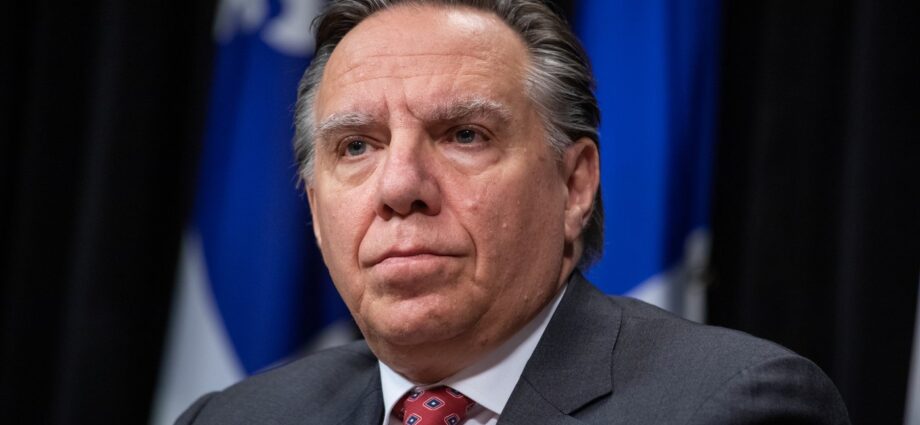
December 11, 2024
In a troubling escalation of Quebec’s secularism agenda, Premier François Legault has announced his intent to ban prayer in public spaces such as parks and streets. This unprecedented move would not only infringe on fundamental freedoms but also set a dangerous precedent that targets religious minorities, particularly Muslims, under the guise of defending “Quebec values.”
Premier Legault’s rhetoric is deeply concerning. During a press conference, he directly addressed “Islamists,” vowing to fight for values like secularism and gender equality. His remarks seemed less about protecting these principles and more about perpetuating harmful stereotypes that cast Muslims as incompatible with Quebec’s identity. By framing public prayer—an act of devotion practiced by people of all faiths—as a threat, Legault is weaponizing secularism to marginalize religious communities.
A Secularism Gone Too Far
The proposed ban not only challenges the Canadian Charter of Rights and Freedoms, which guarantees freedom of religion, but also redefines the meaning of public spaces. Parks and streets are shared spaces where individuals should feel free to express their identity, whether through yoga, tai chi, or prayer. Yet, Legault’s vision of secularism seems to allow only expressions that align with Quebec’s dominant culture, erasing the diversity that enriches society.
Ironically, Legault’s comments came just days before he attended a Catholic mass at Notre Dame Cathedral in Paris—a stark reminder of the double standards at play. Christian rituals, like the Good Friday Way of the Cross or pilgrims praying on the steps of St. Joseph’s Oratory, have long been celebrated in Quebec. Would these acts also be banned, or does secularism selectively target minority faiths?
A Veil of Neutrality, a Weapon of Division
Quebec’s secularism laws, such as Bill 21, have already drawn international criticism for disproportionately affecting Muslims, Sikhs, and Jews. The latest proposal takes this further, equating public prayer with a violation of secular values. Such measures reinforce the notion that religious minorities are second-class citizens, fostering division rather than unity.
Federal Immigration Minister Marc Miller rightly pointed out the hypocrisy of Legault’s stance. “It seems it’s constantly about Muslims,” he remarked, highlighting the disproportionate scrutiny faced by Quebec’s Muslim community. Miller also emphasized the inconsistency in targeting spontaneous prayer gatherings while permitting planned public religious events, such as Christian processions.
The Assembly of Quebec Catholic Bishops has also condemned Legault’s proposal, calling it an attack on fundamental freedoms. In an open letter, they warned that such a ban would be unenforceable and risk alienating people of all faiths. “What is a prayer?” asked Martin Laliberté, president of the Assembly. “Would saying grace before a meal in a park break the law?”
A Slippery Slope Toward Authoritarianism
Legault’s remarks are part of a broader trend of policing religious expression in Quebec. From banning religious symbols in public service to investigating schools for alleged violations of secularism, the government has consistently overstepped its bounds. These measures do not promote equality or inclusion; instead, they fuel mistrust and hostility toward minorities.
Targeting public prayer undercuts the very freedoms that Quebec claims to uphold. It sends a message that religion—and by extension, religious people—has no place in public life. Such a stance is not only unconstitutional but also antithetical to the pluralism that Canada prides itself on.
Defending Freedom for All
Quebec’s secularism agenda must be challenged before it erodes the rights of all its citizens. Public spaces belong to everyone, regardless of their faith or lack thereof. The act of praying in public is not a threat to society; it is an expression of humanity, shared by people of diverse beliefs.
Legault’s proposed ban represents a dangerous conflation of secularism with cultural conformity. If enacted, it would alienate religious minorities and deepen societal divisions. We must reject this misuse of secularism and stand firm in defending the freedoms enshrined in our Constitution.
As Canadians, we must ask ourselves: Is this the society we want to build? One where prayer is policed, and diversity is seen as a threat? Or one where freedom, respect, and inclusion are celebrated as core values?
Subscribe to our newsletter.
Premier Legault, it is essential to recognize that Quebecers of all faiths and backgrounds value their fundamental freedoms. A broader, more inclusive approach to secularism, one that respects the rights of all individuals, would ensure that these freedoms are not compromised in the pursuit of narrow policies.


